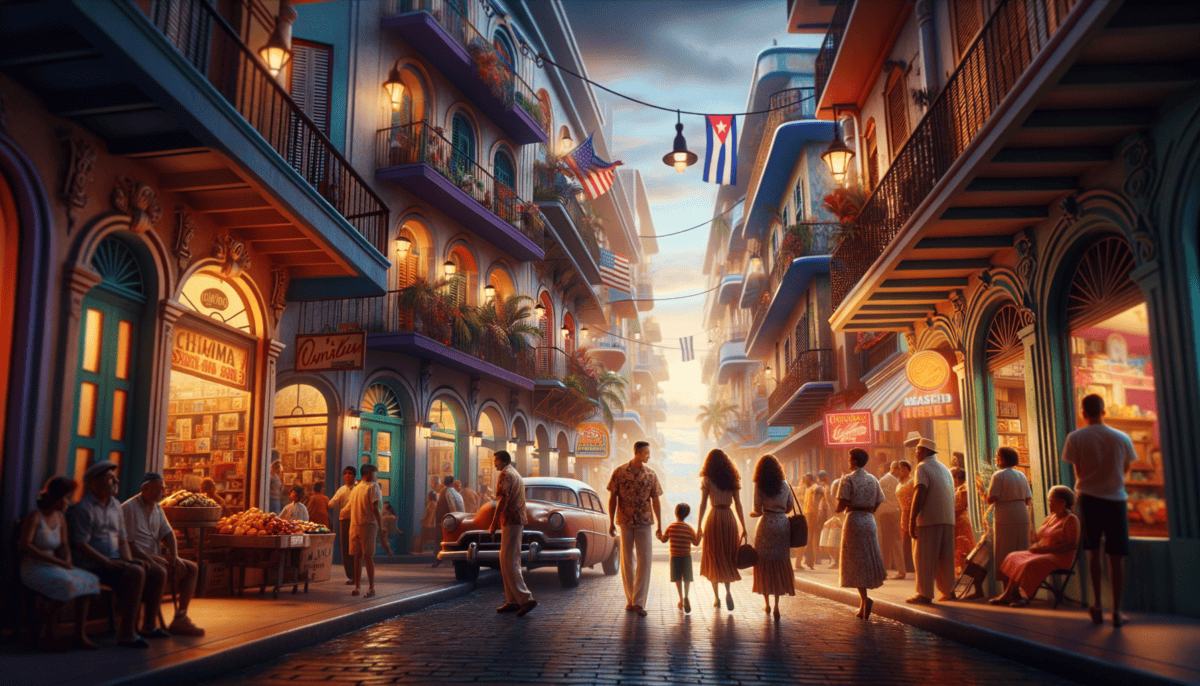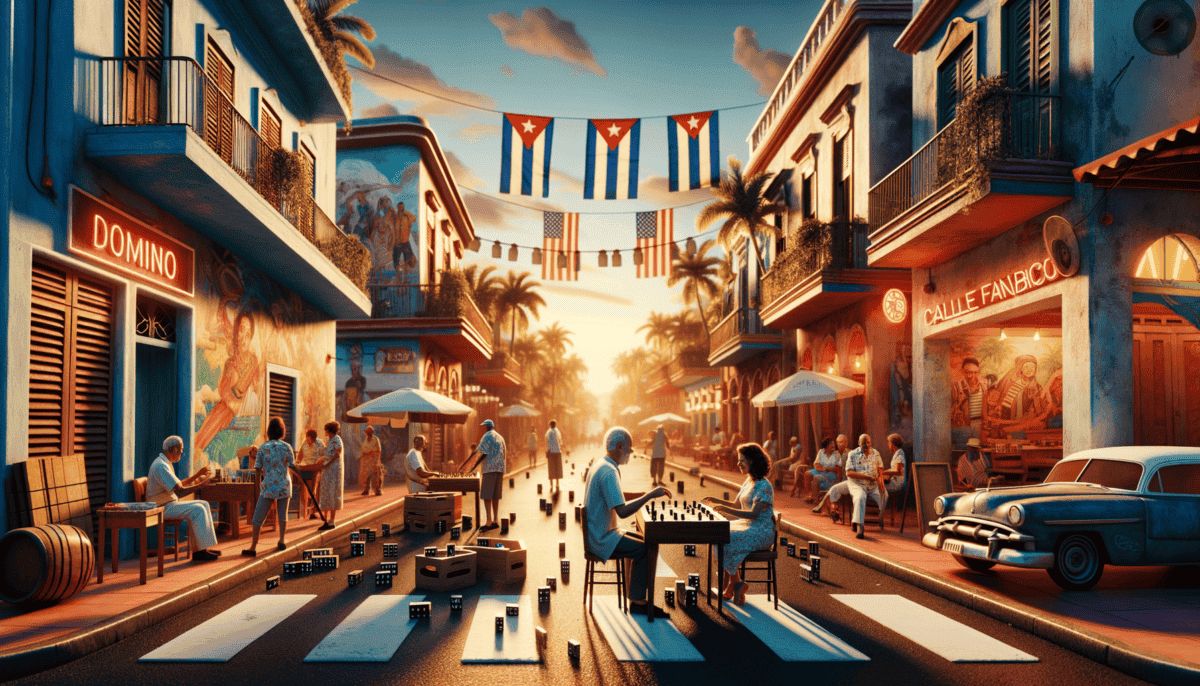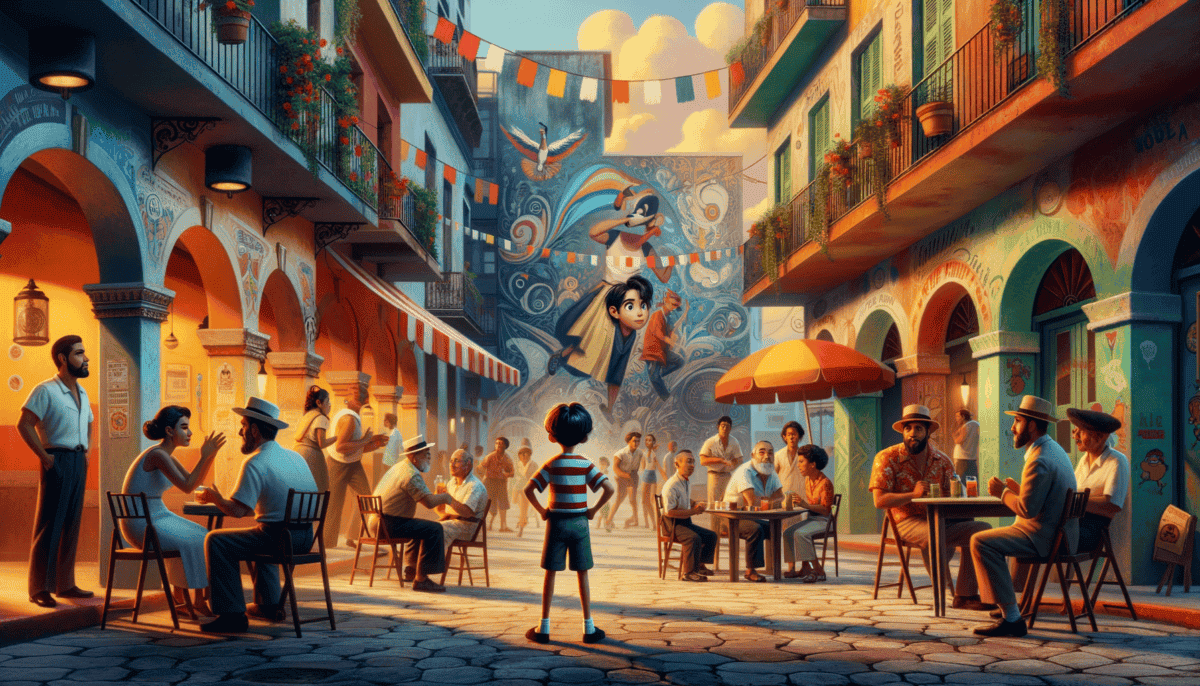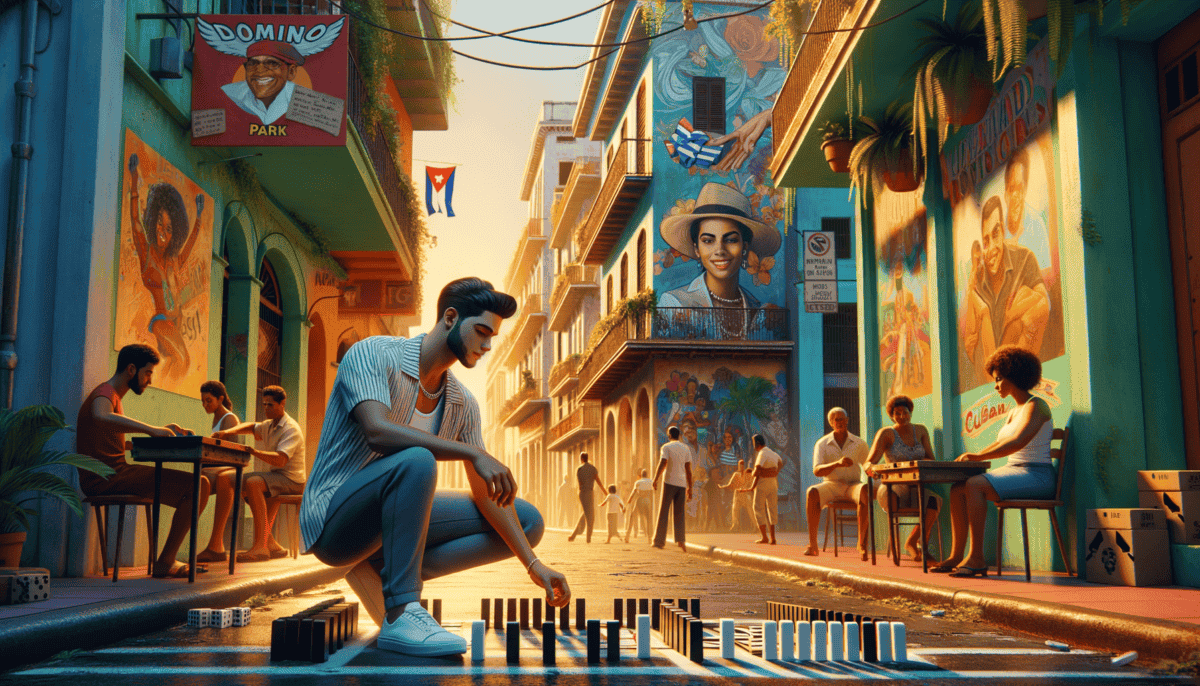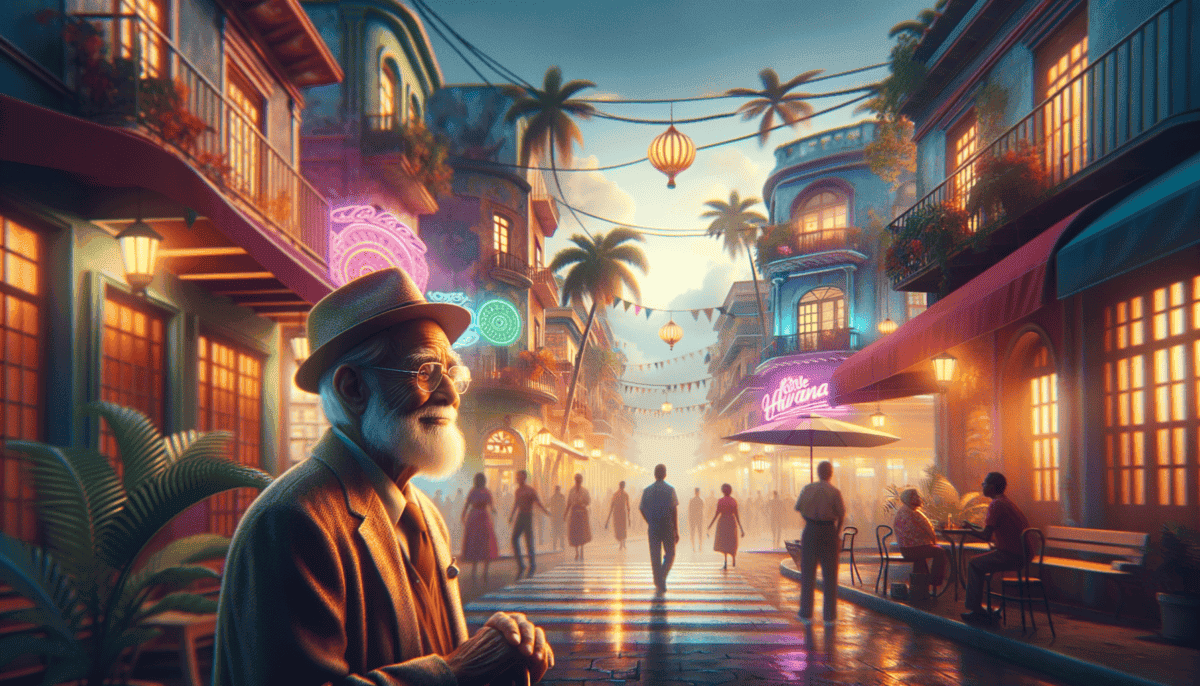A New Beginning
Miguel stared at his favorite toy car one last time. The red paint was chipped, but it still made him smile. He was only eight years old, but he knew this wasn't just another day. Today, his family would leave Cuba forever.
"¡Mijo, es hora!" Mama called from the kitchen. It was time.
The morning sun peeked through the window of their small Havana home. The smell of Mama's last Cuban coffee filled the air. Miguel could hear Papa talking in whispers with Abuelo and Abuela.
Miguel nodded, clutching his toy car tighter. The year was 1962, and many of their neighbors had already left. Some at night, like secrets in the dark. But Miguel's family had papers – they could leave the right way.
"Can I take my car?" he asked softly.
"Of course, pequeño. One toy, remember?"
Outside, the streets of Havana were quiet. Usually, there would be music and laughter, but lately, things had changed. Even at eight, Miguel noticed how people whispered instead of sang.
Saying Goodbye
Abuela hugged Miguel so tight he could barely breathe. She smelled like cinnamon and love.
"Tu eres fuerte," she whispered. "You are strong." She pressed something into his hand – a small medal of San Lazaro, their family's patron saint.
Abuelo's mustache tickled Miguel's cheek as he hugged him. "Make us proud, chamaco. Learn English, study hard, but never forget who you are."
They could only take two suitcases. Mama packed:
- Photos of the family
- Important papers
- Some clothes
- A small Cuban flag
- Mama's favorite cooking spoon
The taxi arrived too soon. As they drove away, Miguel watched his grandparents get smaller and smaller. He held his toy car in one hand and the saint medal in the other.
The Journey North
At the airport, everything was chaos. Many families were leaving. Some children were crying. Some parents too. Miguel stayed close to Mama and Papa.
"Remember," Papa said, putting his hand on Miguel's shoulder. "We are Rodríguez. We are brave. We will make a new life, but Cuba will always live in our hearts."
The airplane was huge and silver. Miguel had never flown before. As they took off, he pressed his face against the window. Below, his beloved Havana grew tiny, like his toy cars.
"One day, mi amor," she answered softly. "One day."
The flight was long. Miguel slept a little, dreaming of his home, his friends, and the mango tree in Abuela's backyard. When he woke up, the pilot announced they were approaching Miami.
Through the airplane window, Miguel saw a new city sparkling in the sun. It looked different from Havana – bigger, with taller buildings. His heart beat faster.
"Look, mijo," Papa pointed. "That's America. That's our new home."
Miguel squeezed his toy car and touched the saint medal around his neck. He didn't know what waited for them in this new place called Miami, but he knew they would face it together. As the plane descended, he remembered Abuela's words: "Tu eres fuerte." You are strong.
They were starting a new chapter, and even though Miguel was scared, he was also a little excited. After all, he was a Rodríguez. And the Rodríguez family was brave.
New Streets, New Friends
The Miami sun felt different from Cuba’s. It was just as warm, but somehow strange. Miguel held tight to Mama’s hand as they walked down SW 8th Street, or “Calle Ocho” as everyone called it.
“¡Bienvenidos!” A friendly lady waved from her porch. Miguel smiled shyly. It felt good to hear Spanish.
First Days
The apartment building had many Cuban families. Upstairs lived the García family with twins Miguel’s age – Carlos and Ana. They had arrived just three months ago.
“Want to play marbles?” Carlos asked in Spanish, showing Miguel his collection. Ana watched from their balcony, braiding her doll’s hair.
Miguel took out his toy car. “I only have this,” he said.
“Cool! We can race it against my trucks!” Carlos grinned.
Learning New Ways
School was the biggest challenge. Miguel sat in class, feeling lost as the teacher spoke in English. But Mrs. Thompson was patient and kind. She gave him picture cards to help him learn.
- Hello = Hola
- Please = Por favor
- Thank you = Gracias
- School = Escuela
- Friend = Amigo
At recess, Carlos helped translate. Soon, other Cuban kids joined their group. They played baseball with a tennis ball and helped each other with English words.
Building Community
Every evening, families gathered in the courtyard. The grown-ups shared coffee and stories while kids played. The smell of Cuban cooking filled the air – just like home.
“Look what I brought!” Mrs. García appeared with a plate. “Pastelitos de guayaba – just like in Havana!”
Miguel took a bite. The sweet pastry tasted like memories of home.
"That's how we make a new home, mijo," Mama smiled, kissing his forehead. "One friend at a time."
Little Victories
Papa found work at a garage fixing cars. When he came home, his hands were dirty but his smile was proud. “Soon we’ll have enough for our own little business,” he’d say.
Mama started selling her famous flan to neighbors. People said it was the best in Little Havana. Miguel helped by delivering orders after school.
One month after arriving, Miguel raised his hand in class. “Mrs. Thompson,” he said carefully in English, “May I sharpen my pencil?”
The whole class clapped. Mrs. Thompson beamed. “Perfect English, Miguel!”
A Place to Belong
On Saturdays, Miguel and his new friends played on Calle Ocho. Old men taught them to play dominoes. A street vendor gave them penny candy and called them “mi gente” – my people.
The sound of Cuban music drifted from open windows. Sometimes, Papa would grab Mama’s hand and dance right there on the sidewalk, making Miguel laugh.
That night, as Miguel got ready for bed, he looked at his toy car on the shelf. Next to it sat his first American baseball card, a gift from Carlos.
“Papa,” he asked, “is this home now?”
Papa sat on the bed’s edge. “Home is where our hearts are, mijo. And our hearts are growing big enough for both Cuba and America.”
Miguel touched the Saint Lazaro medal, still around his neck. He was still a Rodríguez, still brave, but now he was something else too – a Little Havana kid. And that felt just right.
Dreams Take Root
The sweet smell of café cubano drifted through Calle Ocho. Miguel watched Papa unlock the door of their tiny storefront. The sign above read “Sabores de Cuba” in bright red letters.
A Family Dream
“Look, mijo,” Papa said, pointing to the counter. “This is where you’ll help take orders. And here,” he walked to the kitchen, “is where Mama will make her famous ropa vieja.”
Miguel ran his hand along the smooth counter. “Can I ring the bell when orders are ready?”
“Of course!” Mama laughed, hanging her mother’s old recipes on the wall. “You’ll be our official bell-ringer.”
Growing Community
Other Cuban families were opening shops too. Next door, Mr. García started a bodega. Across the street, Mrs. Martinez opened a dress shop.
“We’re making our own little Havana,” Carlos said as he helped Miguel set up tables.
• Bodega García
• Martinez Fashions
• Domino Park
• Cuban Coffee Corner
• Rodriguez Family Restaurant
First Day Jitters
“What if nobody comes?” Miguel whispered to Mama as they prepared to open.
But he needn’t have worried. The smell of Mama’s cooking brought people from all over the neighborhood.
“¡Increíble!” old Mr. Ramirez exclaimed after tasting the picadillo. “Just like my mother used to make!”
More Than Food
Soon, “Sabores de Cuba” became more than just a restaurant. It was where people gathered to share news from home, celebrate birthdays, and help newcomers.
“Miguel,” Papa said one evening, “remember how scared we were when we first came? Now we help others feel at home.”
“Mama,” a young boy asked in broken English, “can I have job like Miguel?”
Miguel smiled, remembering his first days. “I’ll teach you everything I know,” he offered in Spanish.
Music in the Streets
On weekends, musicians played guitars outside the restaurant. People danced salsa on the sidewalk. Even Mrs. Thompson, Miguel’s teacher, came to learn Cuban dances!
“Your mother’s flan is famous now,” Ana told Miguel as they watched the dancers. “Even the American families come just for dessert!”
Growing Stronger
One year after opening, Papa added more tables. Miguel was proud to see his family’s hard work paying off.
“Look what arrived!” Carlos burst into the restaurant one day, waving a newspaper. The Miami Herald had written about Little Havana’s growing Cuban businesses.
Miguel saw their restaurant’s name in print. Below it read: “Where Cuban traditions come alive.”
“We didn’t lose our home,” Papa said softly. “We built a new one. And we helped others build theirs too.”
Miguel looked out at Calle Ocho, now lit up with colorful signs and filled with the sounds of Spanish music. Their little piece of Cuba was growing stronger every day.
The bell on the counter chimed as the last customer left. Miguel smiled, knowing tomorrow would bring new friends, new stories, and new dreams to their corner of Little Havana.
Roots and Wings
Miguel sat in Domino Park, watching elderly men click tiles against wooden tables. The summer breeze carried the rhythm of son cubano from nearby cafes. At thirteen, he felt caught between two worlds.
Stories from Home
“Tell me about Cuba again, Papa,” Miguel asked, helping prep the morning’s bread delivery.
Papa’s eyes lit up. “Ah, mijo. The streets of Havana were like a painting come to life. Music poured from every window…”
“And the beaches?” Miguel prompted, though he’d heard it a hundred times.
“Like heaven touching earth. The water so blue it made the sky jealous!”
Dancing Lessons
Every Saturday, Mama insisted on dance lessons in their tiny living room.
“But my friends are playing baseball!” Miguel protested.
“Baseball is American. Salsa is in your blood,” Mama said, turning up the radio. “One day, you’ll thank me.”
• Dancing salsa and rumba
• Speaking Spanish at home
• Sunday family dinners
• Respect for elders
• Stories of Cuba’s history
Two Languages, One Heart
“English at school, Spanish at home,” Miguel explained to his new friend Tommy. “It’s like having a secret superpower!”
“Can you teach me some?” Tommy asked eagerly.
Soon, even American kids were ordering their sandwiches in Spanish at Sabores de Cuba. “Un sandwich cubano, por favor!”
Keeper of Stories
Mrs. Rodriguez from the cultural center asked Miguel to help with their history project.
“You’re a bridge,” she said. “You understand both worlds. We need young people like you to keep our stories alive.”
Finding Balance
“Can’t I just be American?” Miguel asked one day after a tough school day.
Mama stopped kneading dough. “Being Cuban-American isn’t about choosing sides, mi amor. It’s about having twice the love, twice the culture, twice the strength.” ❤️
Community Pride
The neighborhood planned their first cultural festival. Miguel helped paint murals of Cuban heroes on walls.
“Who’s that?” Tommy pointed at José Martí’s portrait.
“He fought for Cuba’s freedom,” Miguel explained proudly. “Like George Washington did here.”
That evening, watching American kids dance to Cuban music while eating Mama’s pastries, Miguel realized something important.
“We’re not just preserving our culture,” he told Papa. “We’re sharing it.”
Letters to Tomorrow
Miguel started writing his own letters to Cuba, telling Abuelo about life in Little Havana.
“Dear Abuelo, today I taught my friend Tommy to play dominoes. He says Cuban food is his favorite now. I’m learning to be proud of who I am – both Cuban and American.”
As the sun set over Calle Ocho, casting long shadows past the royal palm trees, Miguel felt a deep connection to both his past and future. His heart beat to rhythms both old and new, creating its own special melody.
Dreams Take Flight
Miguel stood tall at his high school graduation, scanning the crowd for his family. At eighteen, he’d grown into a young man who carried both his Cuban heritage and American dreams with pride.
A Family’s Victory
Back at Sabores de Cuba, the celebration was in full swing. The restaurant had grown from a tiny café to a neighborhood landmark.
“Your diploma isn’t just yours,” Papa said, his eyes misty. “It belongs to everyone who crossed the ocean for a better life.”
Miguel looked around at the walls now covered with family photos and newspaper clippings. Each told a story of success:
• First Cuban-American city council member
• Little Havana Cultural Center opening
• Award-winning local businesses
• New community college campus
• Cuban Heritage Month celebration
Community Leader
“Remember when you helped me with English?” Tommy laughed, now fluent in Spanish. “Now look at us!”
Miguel had started a tutoring program at the cultural center, helping new immigrant kids adjust. “We all need someone to show us the way,” he said.
Business and Dreams
The neighborhood was changing. Modern coffee shops opened next to traditional ventanitas. Tourist buses rolled down Calle Ocho.
“Progress is good,” Papa said, “but we must keep our soul.”
Young Voices Rise
“What’s your next move?” Mrs. Rodriguez asked during a community meeting.
“Business school,” Miguel announced. “Then I’m coming back to help our neighborhood grow.”
The room erupted in applause. His generation was ready to lead.
Culture Meets Future
Little Havana’s streets buzzed with new energy. Young artists painted fresh murals beside classic ones. Food trucks served fusion dishes near traditional restaurants.
“It’s like a bridge between yesterday and tomorrow,” Miguel told a newspaper reporter.
The interview made front page news: “Little Havana’s Next Generation: Honoring Roots While Growing Wings”
Family Wisdom
“Abuelo would be proud,” Mama said, reading Miguel’s college acceptance letter.
“I wish he could see this,” Miguel sighed.
“He sees through our eyes,” Papa smiled. “Every success we have here honors his dreams.” ⭐
The Road Ahead
On warm evenings, Miguel still played dominoes with the elders, now teaching younger kids the game’s strategy.
“Our story isn’t just about leaving Cuba,” he told them. “It’s about building something new while keeping something precious.”
The setting sun painted Calle Ocho in golden light, as salsa music drifted through the air. Miguel’s heart swelled with pride. His community wasn’t just surviving – it was thriving.
“Ready for your next adventure?” Papa asked.
“Ready,” Miguel nodded. “Because I know where I come from, I’m not afraid of where I’m going.”
Legacy of Love
Decades have passed, and Miguel’s silver hair catches the morning light as he stands outside Sabores de Cuba. At sixty-five, his eyes still sparkle with the same determination that brought him here as a child.
Morning Traditions
The ventanita window still serves perfect Cuban coffee. Miguel watches tourists and locals mix together, sharing stories over pastelitos. ☕
“Tell us about when you came here,” Sofia, his youngest granddaughter, begs.
“Ah, mi amor,” Miguel smiles. “That story is written in every brick of Little Havana.”
A Living Museum
The neighborhood has become a celebrated cultural landmark. Tour groups snap photos of domino players. Street artists paint new murals that blend old and new Cuba.
• Vibrant art galleries
• Dance studios teaching salsa
• Family restaurants spanning generations
• Cultural festivals every month
• Historic walking tours
Seeds of Success
Miguel’s business school dreams bore fruit. He helped many immigrant families start their own companies. The neighborhood grew while keeping its heart.
“Remember Papa’s words?” he tells his children. “Progress with soul.”
New Generations Rise
Young Cuban-Americans fill leadership roles across Miami. Doctors, lawyers, artists – all carrying their heritage proudly.
Bridges of Time
The old domino tables still host daily games. Miguel teaches his grandchildren the same moves he learned as a boy.
“Each click of the tiles is like a heartbeat,” he explains. “It keeps our memories alive.”
Tomorrow’s Promise
Little Havana faces new challenges. Rising costs worry small businesses. Young families struggle to stay.
But Miguel sees hope in every corner:
Community programs help preserve local shops. Youth groups lead cultural celebrations. The spirit of helping each other grows stronger.
Full Circle
One evening, Miguel finds his old diary from 1962. Tears fall as he reads his childhood fears and dreams.
“We did it, Papa,” he whispers. “We built something beautiful.”
Outside, salsa music fills the air. Children play baseball in the street. Neighbors chat across balconies.
Forever Home
Little Havana isn’t just a place on a map. It’s a testament to courage, love, and determination.
“This is our gift to America,” Miguel tells his family. “A piece of Cuba’s heart, beating strong in Miami’s soul.”
As night falls, the stars shine over Calle Ocho. Miguel holds his grandchildren close, knowing their roots run deep in two lands, growing stronger with each generation. The story of Little Havana continues, written in love, preserved in memory, alive in hope. ⭐


